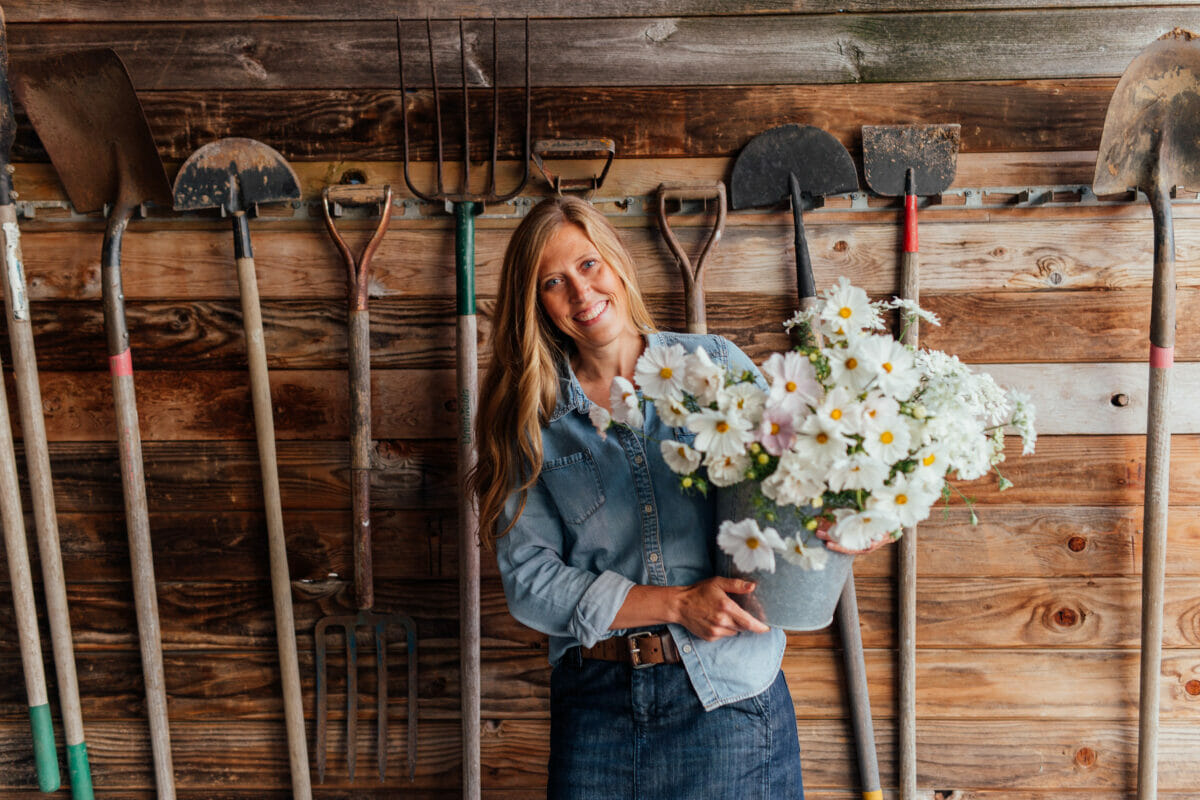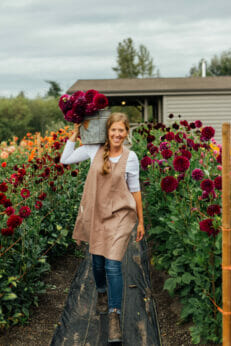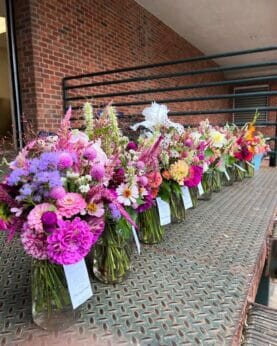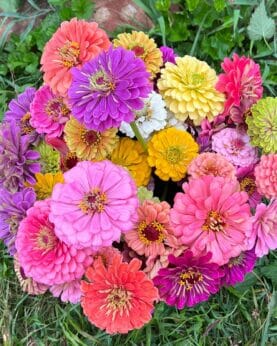These Flower Farmers Are Planting it Forward
From her flower farm in Washington, Deanna Kitchen launched the Growing Kindness Project to plant seeds of community across the world.
These Flower Farmers Are Planting it Forward
From her flower farm in Washington, Deanna Kitchen launched the Growing Kindness Project to plant seeds of community across the world.

Deanna Kitchen gathers blooms on her farm.by Ryleah Foehl Photos
As Deanna Kitchen worked in her garden in the summer of 2010, cutting an unexpected bounty of late-blooming sweet peas, she realized she had more blooms than she could use. A lot more. So, she decided to share them. She collected the blossoms in mason jars, baby food jars and any other containers she could find. Then, with her children in tow, Kitchen loaded up a little red wagon and distributed them at a long-term care facility. “In sharing [the flowers], I had actually found a solution to the problem I was facing. It was this opportunity to create connection in our community,” says Kitchen.

After having her second child and making the difficult decision to leave her career as a teacher, Kitchen felt isolated in her new role as a stay-at-home mom. “I was in a big season of life transition and feeling really alone,” explains Kitchen. “I took up gardening because it was a place of rest during that season.” She lived on a one-acre homestead in a small town about halfway between Seattle and Bellingham, Washington, and dedicated herself to caring for her land.
Ten years later, Kitchen officially launched the Growing Kindness Project, a nonprofit organization with a mission to empower, educate and encourage individuals to cultivate connections in their communities by growing and giving flowers. She moved from the one-acre homestead to a 10-acre farm along the Puget Sound in 2016 and began growing an extensive selection of specialty cut flowers, at one point cultivating as many as 1,000 dahlia plants alone. She documented her journey of growing flowers and giving them away on social media with the hashtag Growing Kindness.

“A tremendous amount of joy for me was not so much growing and selling flowers but connecting with people through flowers,” says Kitchen. “[Our farm] could only reach so far, but if we could invite other people to be a part of what we were doing and help equip them to have what they needed to do it, then we could multiply exponentially throughout communities beyond ours.”
The Growing Kindness Project has flourished, and it is now 2,000 members strong, with people from all over the world growing flowers and donating them to folks in need of a boost. With her time focused on keeping the nonprofit running, Kitchen has scaled back her farming efforts, currently growing about 500 dahlia plants on only a fraction of an acre. Under the name Twig + Vine, she sells dahlia tubers, designs floral arrangements for events and hosts workshops. Kitchen donates the majority of her flowers to local food banks and long-term care facilities, giving an average of 500 arrangements per season.

Meanwhile, the Growing Kindness Project members give away untold numbers of flowers each year. The organization is open to all, regardless of experience level or yield. It doesn’t matter if you can donate one stem or 1,000 stems. Some members are planting seeds for the first time, while others are working farmers, donating portions of their flower crops. “If you’re a flower-based business, it doesn’t mean you stop selling flowers and give everything away,” says Kitchen. “Make donating to your community an intentional part of what you do in whatever volume makes sense.”
In its online community, the organization provides education and resources for new floriculturists and experienced flower farmers. Interested folks can learn how to plan a garden, set up irrigation systems and grow flowers. There are also resources on how to design floral arrangements and ways to donate flowers.
Once the flowers are ready for gifting, it’s up to the growers to identify the recipients. Some members take their cut flowers to women’s shelters, refugee families and, in the case of Fern Creek Florals, inpatient families at a children’s hospital.

Jen Koym started Fern Creek Florals, a cut flower farm and donation garden in Charlottesville, Virginia, during the pandemic, as a way to bring some joy to her family. Replacing a 400-square-foot vegetable garden, Koym grew a number of varieties, from sweet peas and stock, lisianthus and poppies to dahlias and roses. When the farm filled with blooms, she decided to share in her bounty, donating a handful of bouquets during its first growing season in 2020. By 2022, Fern Creek Florals cultivated about 2,800 square feet and gave away around 280 arrangements.
Koym learned about the Growing Kindness Project after she had already implemented its mission. She immediately joined as an ambassador, a role that involves championing the organization and encouraging people to join in. “One of the nice things about gardening is that it’s so easy to share. There’s an abundance, so you can collect seeds and bulbs and corms and tubers and pass them on. It’s another wonderful way of spreading kindness,” says Koym. “There are so many ways to sow it forward.”
In addition to operating Fern Creek Florals, Koym runs LilyPads Housing, a non-profit organization that helps locate temporary housing for the families of pediatric patients at the hospital where she also donates flowers.

Sarah Adams recalls moving into a LilyPads apartment last year while her baby awaited a heart transplant. She received a welcome bouquet from Fern Creek Florals upon her arrival and many arrangements after that. “It was a very dark and scary time, so having gorgeous fresh flowers in the apartment was a bright spot. The thought behind them was even more special,” says Adams, who spent nearly a year with her child in hospital. “I would frequently see a cart with the most beautiful floral arrangements you can imagine. Without fail, they were always a delivery from Fern Creek Florals.”
It’s stories like those of Koym and Adams that keep Kitchen energized to continue the work of the Growing Kindness Project. She wants more people to take part in the joy of this community and in the cultivation of flowers. To that end, she has started developing programs for sponsorships and grants and expanding educational resources to remove economic and educational barriers to access. “If you have a little bit of dirt and a big heart, you have what it takes to grow kindness in your community,” says Kitchen. “What you have is enough. Who you are is enough. Start where you are, use what you have, do what you can. It really does have the opportunity to make a huge impact.”
Follow us
This work is licensed under a Creative Commons Attribution-NoDerivatives 4.0 International License.
Want to republish a Modern Farmer story?
We are happy for Modern Farmer stories to be shared, and encourage you to republish our articles for your audience. When doing so, we ask that you follow these guidelines:
Please credit us and our writers
For the author byline, please use “Author Name, Modern Farmer.” At the top of our stories, if on the web, please include this text and link: “This story was originally published by Modern Farmer.”
Please make sure to include a link back to either our home page or the article URL.
At the bottom of the story, please include the following text:
“Modern Farmer is a nonprofit initiative dedicated to raising awareness and catalyzing action at the intersection of food, agriculture, and society. Read more at <link>Modern Farmer</link>.”
Use our widget
We’d like to be able to track our stories, so we ask that if you republish our content, you do so using our widget (located on the left hand side of the article). The HTML code has a built-in tracker that tells us the data and domain where the story was published, as well as view counts.
Check the image requirements
It’s your responsibility to confirm you're licensed to republish images in our articles. Some images, such as those from commercial providers, don't allow their images to be republished without permission or payment. Copyright terms are generally listed in the image caption and attribution. You are welcome to omit our images or substitute with your own. Charts and interactive graphics follow the same rules.
Don’t change too much. Or, ask us first.
Articles must be republished in their entirety. It’s okay to change references to time (“today” to “yesterday”) or location (“Iowa City, IA” to “here”). But please keep everything else the same.
If you feel strongly that a more material edit needs to be made, get in touch with us at [email protected]. We’re happy to discuss it with the original author, but we must have prior approval for changes before publication.
Special cases
Extracts. You may run the first few lines or paragraphs of the article and then say: “Read the full article at Modern Farmer” with a link back to the original article.
Quotes. You may quote authors provided you include a link back to the article URL.
Translations. These require writer approval. To inquire about translation of a Modern Farmer article, contact us at [email protected]
Signed consent / copyright release forms. These are not required, provided you are following these guidelines.
Print. Articles can be republished in print under these same rules, with the exception that you do not need to include the links.
Tag us
When sharing the story on social media, please tag us using the following: - Twitter (@ModFarm) - Facebook (@ModernFarmerMedia) - Instagram (@modfarm)
Use our content respectfully
Modern Farmer is a nonprofit and as such we share our content for free and in good faith in order to reach new audiences. Respectfully,
No selling ads against our stories. It’s okay to put our stories on pages with ads.
Don’t republish our material wholesale, or automatically; you need to select stories to be republished individually.
You have no rights to sell, license, syndicate, or otherwise represent yourself as the authorized owner of our material to any third parties. This means that you cannot actively publish or submit our work for syndication to third party platforms or apps like Apple News or Google News. We understand that publishers cannot fully control when certain third parties automatically summarize or crawl content from publishers’ own sites.
Keep in touch
We want to hear from you if you love Modern Farmer content, have a collaboration idea, or anything else to share. As a nonprofit outlet, we work in service of our community and are always open to comments, feedback, and ideas. Contact us at [email protected].by Laura Drummond, Modern Farmer
July 7, 2023
Modern Farmer Weekly
Solutions Hub
Innovations, ideas and inspiration. Actionable solutions for a resilient food system.
ExploreExplore other topics
Share With Us
We want to hear from Modern Farmer readers who have thoughtful commentary, actionable solutions, or helpful ideas to share.
SubmitNecessary cookies are absolutely essential for the website to function properly. This category only includes cookies that ensures basic functionalities and security features of the website. These cookies do not store any personal information.
Any cookies that may not be particularly necessary for the website to function and are used specifically to collect user personal data via analytics, ads, other embedded contents are termed as non-necessary cookies.